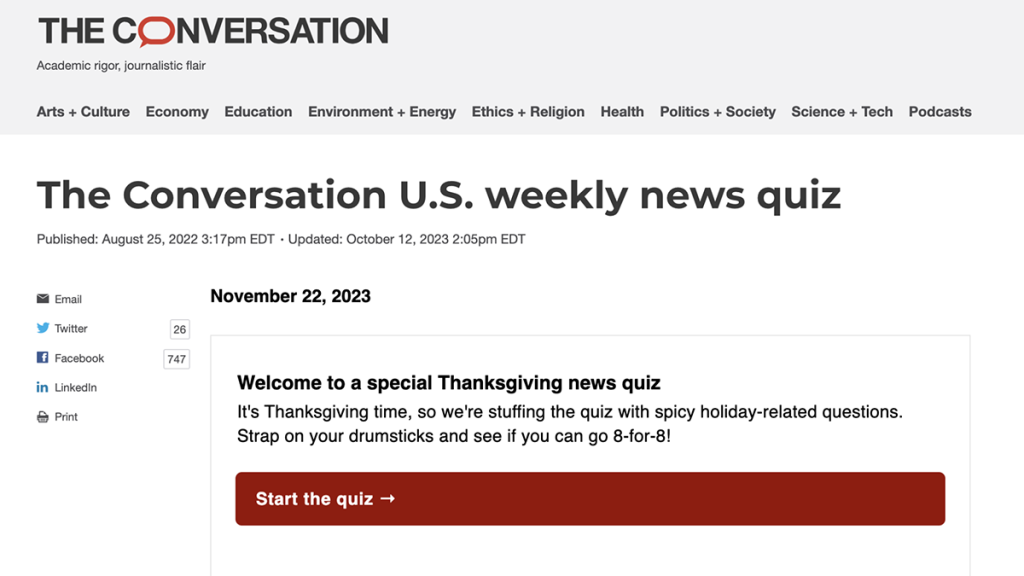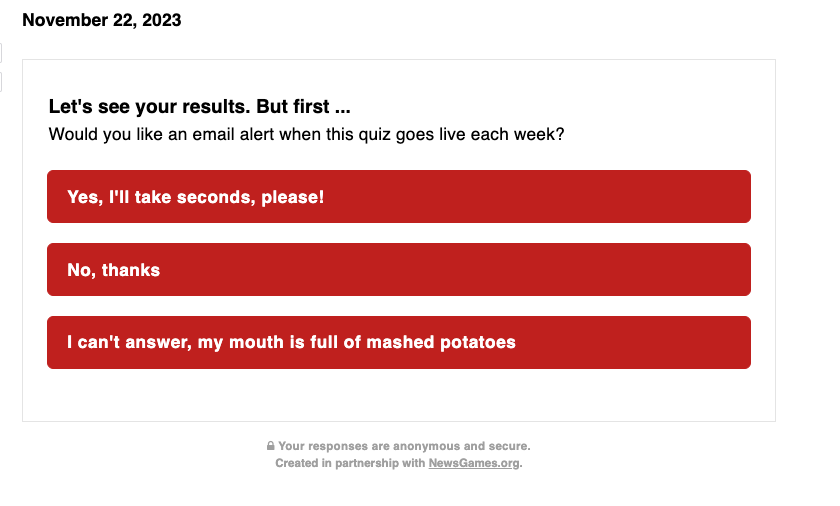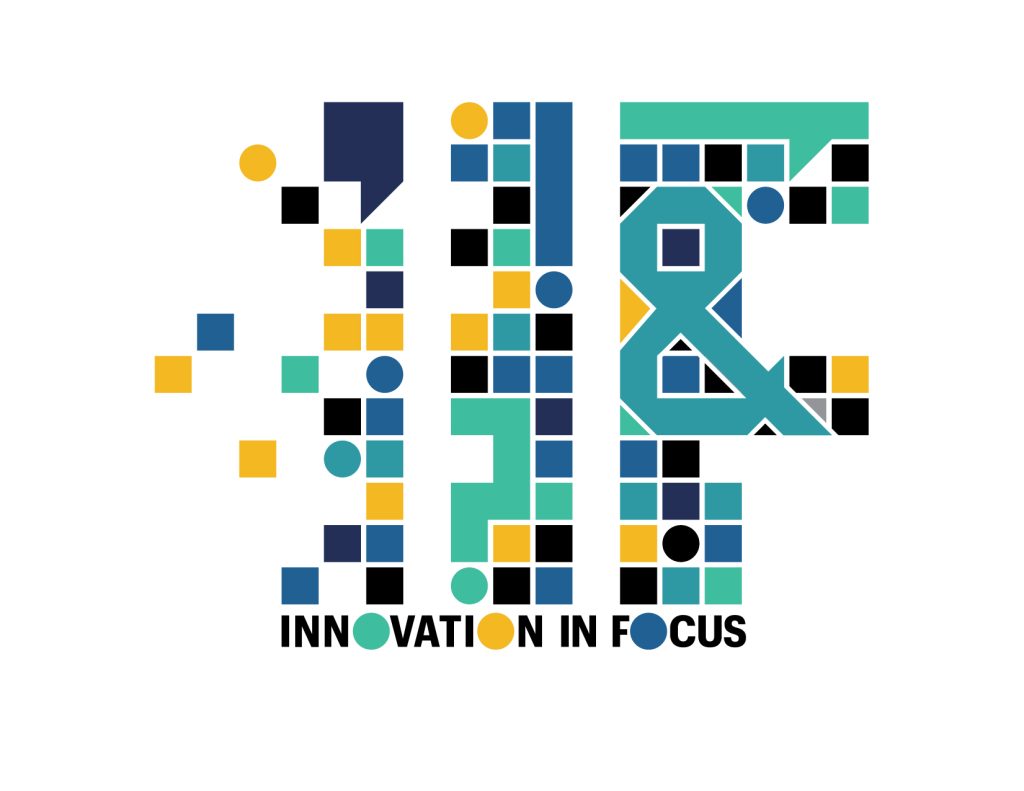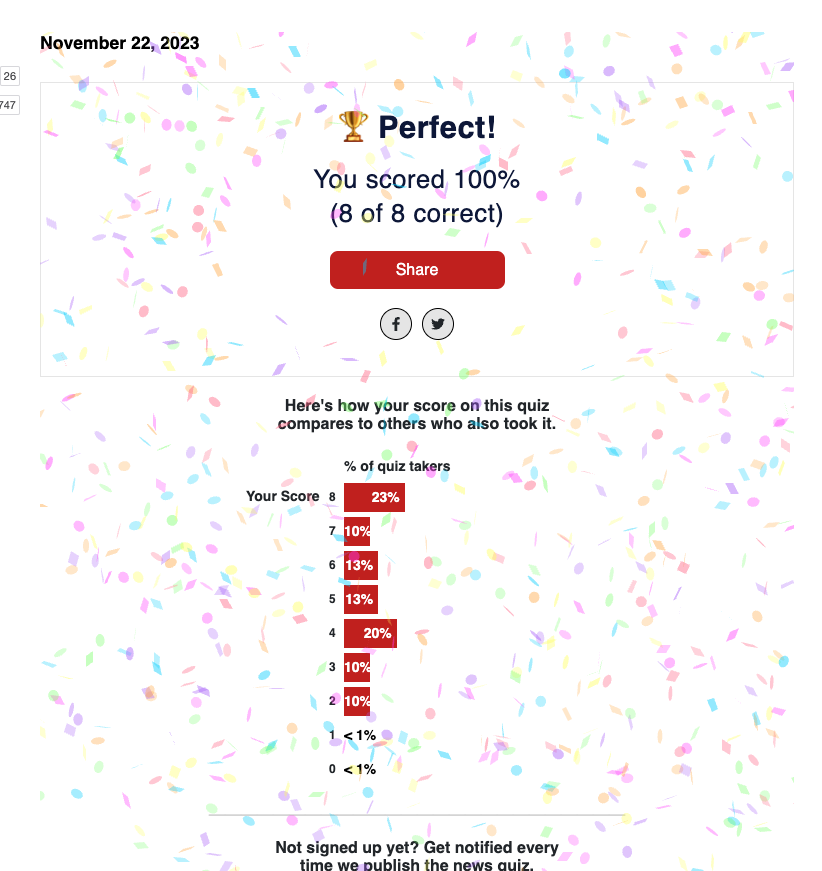
Crafting an engaging news quiz: “Help people feel that there is a human heart beating behind the in-depth news”
A Q&A with Fritz Holznagel at The Conversation

Fritz Holznagel is the quizmaster for The Conversation’s weekly news quiz. A professional writer and fun fact fanatic, Holznagel has worked for tech companies, written for film and video — even earning an Emmy Award for scripting a CBS animated special — and holds the title of 1995 winner of the Jeopardy! Tournament of Champions.
As the Innovation in Focus team experimented with strategies and tools for creating news quizzes, we spoke with Holznagel to hear what he’s learned while writing the widely-shared quizzes for The Conversation.
Lytle: How do you determine which questions to include in the news quizzes?
Holznagel: First, they need to be relevant to a recent story that was done in the U.S. version of The Conversation. I’ll try to cover anything that’s a huge story such as if the government shuts down, we have to have a news quiz question about that.
At the same time, our news quiz is a little bit whimsical. I try not to hammer away at any one story, especially if it’s a really hard story. We’ve done questions about the Israel Palestine war, but in our quiz, I don’t wanna go there every week. We did a poll a few months ago, and one of the interesting things we heard from them is they wanted more climate change questions and less Donald Trump and Elon Musk questions. Our readership likes to go deep on things, and they don’t really want stories that are just negative; it’s less gossip-oriented and more hard-news oriented.
I especially like trying to find that little nugget that makes a good question. For example, one of the stories this week was about growing cranberries in America because Thanksgiving is coming up. I looked through it and saw that Wisconsin was the biggest provider of cranberries; they grow 60% of cranberries in America. I was like, “that’s supposed to be Massachusetts!I live here and there’s an Ocean Spray factory just down the way.” So that sparked my interest. I definitely make sure we have this week’s big stories represented, but also the quizzes are my little area where I choose stories based on which ones I think will have the best engagement. .
Lytle: What are you trying to accomplish with the news quizzes?
Holznagel: Three things. One of them is to try and drive readership to the stories themselves. We’ve actually added some links, and the software we use has made it pretty helpful for us to add more links to the stories so that people can find them. After you read every question, a link to the story is right there so that the readers can click on the link and read more. The second is building a sense of community for people who are fans of The Conversation. This is a way for people to feel connected to us and feel like they’re part of this Conversation community. I think that that ties into the third thing, which is that I try to make the conversation friendly and fun. A part of my job is to have a little fun, make things a bit light, and help people feel that there is a human heart beating behind the in-depth news. To achieve that, we throw in some funny answers when they seem appropriate, and just generally try to make the questions lively and conversational.
Lei: Have you ever used the AI-powered tools to help you generate news quizzes?
Holznagel: The AI thing is really interesting to me. I used to work at Google, so I have some familiarity with their programs and with the history of the AI they have been working on. I use Bard quite a bit now in writing this quiz, but it’s never in the way I’ve seen others suggest to use it. I’ve seen suggestions to, for example, tell it to “make me a multiple choice question quiz of 10 questions on colonial history with one right answer and 3 wrong answers for each one,” and then it cranks something out. I haven’t used it that way, and I don’t imagine I would ever use it that way. This is partly because it’s more fun to do the quiz myself, and partly because somehow that doesn’t feel quite right.
How I do love to use AI is to inspire my own ideas. I’ll go and ask Bard: “I’m running a multiple choice question about this skull that was found. The correct answer is Piltdown man. I have this other wrong answer I’m doing. Can you give me some other wrong answers?” Then the AI will say: What about this? What about this? And usually it’s not right, but it’ll be like, that’s a good direction. I’ll do this. It’s very helpful as a brainstorming tool.
Lytle: Do you have any incentives for taking or doing well on the quiz?
Holznagel: We gave away stickers, and people love it. It’s not a formal thing; it’s like: If you win 8 for 8 this week, send us a screenshot of the final screen, and we’ll send you a sticker from The Conversation. You must be one of the first five people or something like that. And sure enough, people write in right away. It’s awesome. It’s exciting.
I do think simple is the way to go with incentives like that. You might think a T-shirt or gift certificate, people would really fight for that, and they probably would. But then things get more serious, and you might have arguments about whether they got all the 8 questions right. Trust me, I know the quiz world, and the bigger the prize, the more complicated the arguments, the more impassioned people get about it. With something that’s low level, like stickers, you just tell them, oh, sorry, you’re one too late. And they’re like, Oh, darn! But nobody’s going to go freak out about it. The lightheartedness almost makes it more fun of a contest.
Another useful thing: After you take the eighth question and before you get your results. There’s an interstitial screen where we say, before you get your results, ‘Would you like to sign up for the newsletter?’ and ‘would you like to get an email every week when this quiz is done?’ Because people are so driven to find out how well they did and compare themselves, if you just go straight to the final screen and it’s ‘here’s your score’, then they’re gonna be over. You get a nice chance there to interact with the audience and ask them that. I do think that a really important part of this new quiz software we use.

Lytle: While you’re writing the quizzes for The Conversation’s audience, the quizzes are also published by other publications that have different audiences. What do you think about that when you’re writing the quiz?
Holznagel: One of the things we do in thinking about that is, we always phrase questions like “On November 6th, the Supreme Court heard testimony on this new gun law…” rather than “On Wednesday…,” because first of all, the quiz may be viewed next week anyway on The Conversation website. But when it gets republished it’s going to be kicking around. We do tend to be very precise about dates for that reason.
Lytle: How do you get feedback from the audience about the news quizzes?
Holznagel: That’s one of the shortcomings of my interactions with our readers and the tool itself is we don’t really have a way to indicate which questions people found super entertaining or didn’t like.
We have: How many people started? How many people finished? You can see where they dropped off through the eight questions. You know, a certain number of people get to six, and then just throw up their hands. But you can’t really see if this was a quality question, this wasn’t, or people were really excited about this or not excited about that. The only way we really get that feedback is when somebody writes in, and most of the time it’s just, “I love the quiz,” or it’s, “you got this wrong.”
The quiz gets published in a few papers, and so they always get it right away and look at it, and then send us questions or comments, like it’s too easy or that’s too hard. We have this one person that I know every week is gonna write back, and if anything stood out or anything didn’t look right, or if it was just like a general critique of the whole quiz, I know they’re gonna give it to us, because they’re running it for their readers and talking to them about it on Facebook. The publishers are really a useful source of information, and it might be that quizzes should have somebody in the newsroom, like a quiz ombudsman, somebody who looks at the quiz every week and gives feedback. It’s sort of by chance that we have that person, but I find it very valuable.
Editor’s Note: This interview has been edited for clarity and brevity.

Sign up for the Innovation in Focus Newsletter to get our articles, tips, guides and more in your inbox each month!


